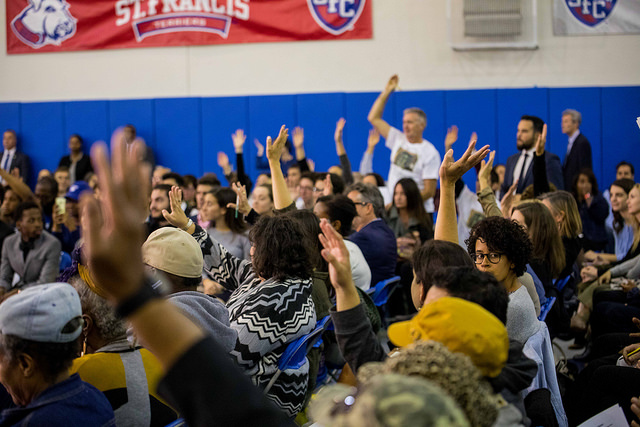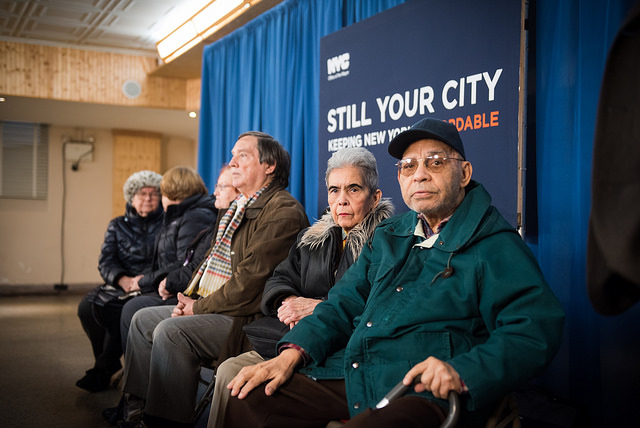Politics, Money, and the ‘Spirit of the Law:’ Why New York Needs a Constitutional Convention

(photo: Benjamin Kanter/Mayor's Office)
The federal corruption trial of Norman Seabrook, former head of the correction officers’ union, has introduced new evidence of the contaminating role money plays in politics throughout the state. Jona Rechnitz, a wealthy real estate developer with a taste for power, became a star witness in the case after he got caught in the middle of an alleged deal that allowed Seabrook to get a kickback for investing the union’s pension funds in a risky hedge fund. Rechnitz had also been associated with allegations concerning the Port Authority and Westchester County, was found to have given expensive gifts to police brass in New York City in exchange for special treatment, and had donated so much money to Mayor Bill de Blasio’s election campaign in 2013 that he was appointed to the mayor’s inauguration committee.
In the course of testimony, Rechnitz could not seem to restrain himself in bragging about his easy access to City Hall after raising more than $150,000 for the mayor -- access the mayor partially denies. In March, de Blasio had been relieved of criminal charges in two investigations when the Manhattan District Attorney and the U.S. Attorney issued coordinated statements indicating that there was insufficient evidence to prosecute him or his staff.
In a ten-page public letter, however, District Attorney Cyrus Vance declared, “the parties involved cannot be appropriately prosecuted,” but added, “this conclusion is not an endorsement of the conduct at issue.” He elaborated, “the transactions appear contrary to the intent and spirit of the laws that impose candidate contribution limits,” further explaining that the relevant statutes “are meant to prevent corruption and the appearance of corruption in the campaign financing process.”
With all due respect to Mr. Vance, I beg to differ with his conclusion, at least in part.
“Spirit of the law” is a legal concept that commonly refers to higher order values that statutes are designed to fulfill. In this particular case, the laws in question could have been intended to limit contributions, or more generally “prevent corruption or the appearance of corruption,” but practically speaking, they are only half-hearted attempts to do either. When it comes to elections or politics, the real intent of the state law in New York is to create the illusion that legislators intend to limit the role money can play, while they incorporate loopholes to undermine effectiveness. Such a charade is the real “spirit of the law,” and one reason to seize opportunity to change it.
Let me be specific. In New York State, an individual cannot donate more than $10,300 to the campaign of a single candidate. Ostensibly, the objective here is to prevent a donor’s undue influence over an elected official. A person can, however, donate up to a $103,000 to county political committees, which in turn can support a candidate with that money and more.
District Attorney Vance had his own explaining to do last month when it was disclosed around two controversial and high profile cases that he took campaign contributions from lawyers who conduct business with his office. When asked about the practice, Vance’s response was “It’s legal.”
The sad reality is that money is the fuel of American politics. If you want to enter the political arena, the first thing you need to do is fundraise. Unless you are independently wealthy, you need to attract donors. People don’t always contribute to campaigns out of altruism to greater causes or belief in a candidate’s capacity to do good. Donors, especially big donors, expect to be granted influence that may or may not benefit them personally.
Independently wealthy candidates who can afford to spend their own money on an election bring their own problems. Mayor Michael Bloomberg spent such unfathomable amounts of money to get himself elected three times (nearly $110 million in 2009 alone) that it distorted the democratic process. (His main opponent, William Thompson, spent $10 million). Under the law, there is no limit to what a candidate can spend on his own campaign, even in New York City, which has significantly more robust campaign finance laws than at the state level.
In fact, Bloomberg had so much money that he famously gave it away. When he was in office, Bloomberg’s top deputy mayor simultaneously served as the CEO of his private philanthropic foundation, which dispersed millions of dollars to applicants for various projects. The city Conflicts of Interest Board approved the arrangement, making it legal. When Bloomberg petitioned the City Council to overturn a term limits law so he could seek a third term, there were press reports that his aides pressured beneficiaries of his philanthropy to testify on his behalf.
Governor Andrew Cuomo and the New York State Legislature have ignored appeals to enact meaningful election reforms to reduce the influence that money has in politics. In 2014, Cuomo abruptly and controversially dismissed his own Moreland Commission investigating corruption in the state. The Legislature in Albany is reputed to be one of the most corrupt and dysfunctional in the country. Over the past ten years, more than two dozen of its members have been convicted or sanctioned for wrongdoing, including the top leaders of both houses, who have been sentenced to jail (their convictions were each recently overturned based on new Supreme Court precedence, but they will be retried in 2018).
The legislative process is invested in the status quo and rigged against reform.
New Yorkers have a legal way to circumvent the legislative process by holding a constitutional convention if they vote to do so on Election Day. It is question one on the back of the ballot, where a “yes” vote would trigger the convention process.
A convention would open discussion on a range of controversial issues, and it cannot fix all that is wrong with a money-driven political process that has been further compromised by the federal judiciary. Yet, given the hidebound thinking that immobilizes Albany, a convention is the only way to get the reform ball rolling on matters that go to the heart of the democratic process and its fundamental integrity.
***
Joseph P. Viteritti is the Thomas Hunter Professor of Public Policy at Hunter College and author of The Pragmatist: Bill de Blasio’s Quest to Save the Soul of New York.
***
Have an op-ed idea or submission for Gotham Gazette? Email This email address is being protected from spambots. You need JavaScript enabled to view it.
Why Tenants Should Vote Against a Constitutional Convention

(photo via The Mayor's Office)
Every 20 years, the New York State Constitution mandates a statewide vote on whether to convene a convention to consider amending it. On Tuesday, Election Day, New Yorkers will vote “yes” or “no.” This measure, question one of three on the back of the ballot, is more important than anything on the front.
Tenants Political Action Committee debated this question at length, and despite many arguments in favor, we voted unanimously to oppose a “con con” this time around.
This was not a decision we took lightly. With a state government that is a model of dysfunction and gridlock, it is tempting to try an end-run around the governor and state Legislature to attempt necessary reforms they have refused to enact despite the stunning number of politicians who have been convicted of corruption and gone to prison.
Many New Yorkers of good will believe that a constitutional convention could force such reforms into being, and indeed that is a theoretical outcome. But the risk of a negative result for tenants and other constituencies that do not have access to piles of cash is very real.
One negative is that delegates are chosen based on the 63 state Senate districts. Because Democratic Gov. Andrew Cuomo allowed the state Senate Republicans to draw hyper-partisan district lines to preserve their shrinking majority, this could result in Republican delegates to a convention having a majority.
There is every reason to believe that the very politicians we now criticize for refusing to enact progressive reforms would control the convention. Current and former elected officials, and even lobbyists, are eligible to run, and legislators could use their superior name recognition and campaign funds to outgun grassroots candidates. Anyone who understands how Albany really works sees the probable composition of a convention as inclined to do the bidding of special interests.
Beyond the potential to water down critical protections for poor people, workers, civil rights, and wilderness, there is one possible “reform” of special importance to tenants: allowing special interests to place legislation directly on the ballot by petition. Many states allow this already. New York does not.
If such a referendum process was added to the state constitution, it is not hard to imagine the real estate lobby initiating a statewide referendum to terminate rent control laws, which only exist in New York City and the downstate suburbs. In fact, this is exactly how Massachusetts ended rent controls in 1994, passing a statewide referendum 52 to 48 percent. Only three cities in the eastern part of the state had rent control – Boston, Cambridge and Brookline – and the landlords’ multi-million-dollar media campaign in central and western Massachusetts made much of the fact that the mayor of Cambridge lived in a rent-controlled apartment.
The analogy with New York is clear. New York City landlords would spend any amount to get rid of rent regulations via statewide ballot initiative. And if they failed the first time, they would keep trying.
Some progressive groups take the position that this would be a good change in New York. They should consider the downside. Ballot initiatives are easier to mount by groups with superior resources, and easier for them to win for the same reason.
We think there is a better way: in the last year, thousands of New Yorkers have become involved in organizations that work to raise political awareness and seek to hold politicians accountable, with a focus on swing districts and turncoat Democrats. The energy coming out of these efforts is inspiring. Let’s harness it to elect better legislators and change our laws at last.
***
Michael McKee is treasurer of the Tenants Political Action Committee. On Twitter @TenantsPACNY.
***
Have an op-ed idea or submission for Gotham Gazette? Email This email address is being protected from spambots. You need JavaScript enabled to view it.
GothamTalks: Why You Should Vote in Local Elections

Gotham Gazette and New Leaders Council -- a nonpartisan, nonprofit leadership institute -- have partnered with Manhattan Neighborhood Network to create a series of video commentaries by New York City civic activists. GothamTalks is short video essays submitted through the New Leaders Council alumni network, which consists of hundreds of New Yorkers working in advocacy, government, campaigns, nonprofits, business, law, and other aspects of city life.
Like both the reporting we do at Gotham Gazette and the written op-ed columns we publish, the GothamTalks video commentaries range in subject, but are all meant to move the public discussion forward. Please watch, listen, and let us know what you think. Use #GothamTalks on social media, and tag us @GothamGazette and @NLC_NYC.
Note: The views expressed in GothamTalks are entirely those of the commentators, and not of Gotham Gazette or New Leaders Council.
************
November 3, 2017
Max Markham
Voting in Local Elections




